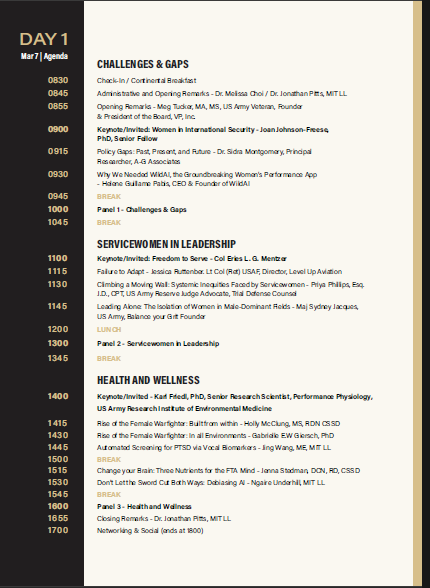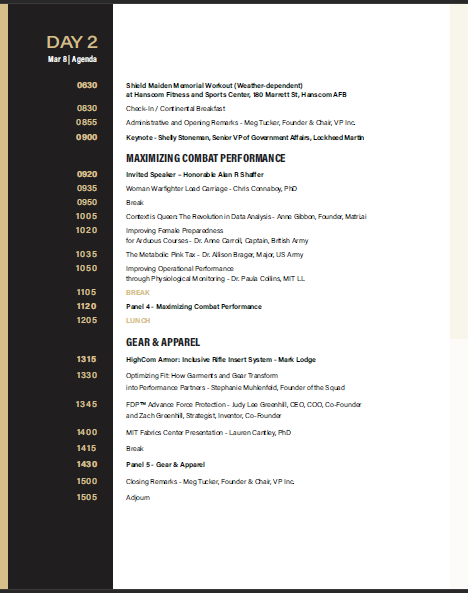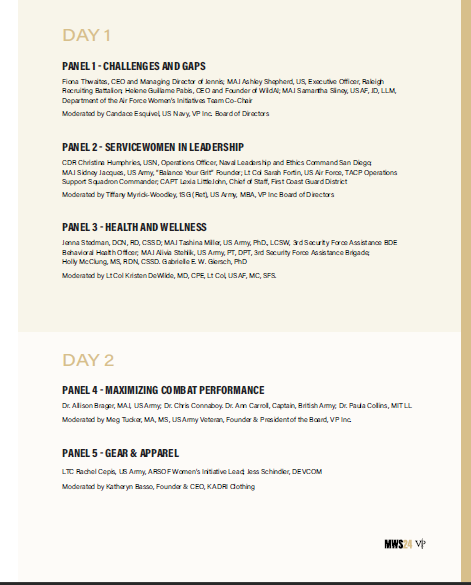
Home content
Hosted by The Valkyrie Project, Inc. and MIT Lincoln Laboratory, the Military Women’s Symposium aims
to illuminate the untapped potential of the American female service member and identify ways to
maximize it. This event coalesces cutting-edge advancements in research and technology, empowering
women to answer the nation’s call across the full spectrum of conflict in 2025 and beyond.
WHY HAVE A MILITARY WOMEN’S SYMPOSIUM?
Women are under-researched in the scientific community, and this has direct and significant implications for the
Department of Defense. This issue is highly topical thanks to recent Biden Administration policies such as the
“The White House Initiative on Women’s Health Research,” which acknowledges significant gaps and sets in
motion a plan to address them. The DoD is taking note as well. Diversity, equity, and inclusion initiatives across
the Department of Defense have been reinvigorated as more women seek combat arms and special operations
assignments. Several service branches have recently established women’s initiatives to address persistent, gendered
issues in their formations.
For The Valkyrie Project, Inc. (VP), the annual Military Women’s Symposium (MWS) is a commitment to advancing the dialogue around empowering female service members (FSMs) to meet their full potential, in turn maximizing
the U.S. military’s competence in competition and combat. Full FSM potential is met when research, resources, and innovation converge into action on the part of both individual service members and DoD leadership. MWS is
our commitment to the idea that military service is not a battle of the sexes, but rather a meritocracy wherein every able-bodied American with the desire to serve is given the maximum resources and support to meet the highest call.
SYMPOSIUM TOPICS
MWS24 will be a gathering of speakers, researchers, tech innovators, and expert panelists to inform, educate, and discuss the following topics:
• Current Challenges and Gaps in Policy and Practice Related to FSMs — Though the last decade has seen improvements in FSM participation in formerly closed military roles and healthcare support,
there remains massive room for improvement across many topics. These include: health and human performance research in sex differences; complete and efficacious policy around family planning; and
cross-federal-agency knowledge management and sharing of best practices. Addressing these gaps could mitigate FSM retention challenges currently faced by the DoD.
• Maximizing Combat Performance — Though the U.S. Combat Exclusion Rule was lifted over a decade ago and all combat roles and special operations specialties have been opened to FSMs, human
performance resources for FSMs remain inadequate. The key to optimizing FSM combat performance is twofold. First, we must get the basics right by building the body of research on women’s physical
and cognitive performance, sex hormone factors, and environmental factors. Then we must apply those basics to human-enhancing technologies such as algorithm- and biometric-based wearables, human—
machine teams, and individually tailored fitness and nutrition protocols.
• Gear and Apparel — The DoD is undeniably a gargantuan customer in the space of tactical gear, apparel, and weaponry; millions of dollars are spent annually to outfit our warfighters. Yet, just as most human
performance research is male-oriented, these industries design their products almost exclusively for male bodies. This leaves FSMs with impractical, poor-fitting, performance-hindering warfighting gear
and garments. Investing in gear and apparel that fits FSM bodies properly, accounts for elemental and sex hormone factors, and optimizes functionality could increase warfighting effectiveness, reduce injury,
and reduce related healthcare costs.
• Servicewomen in Leadership — While women only represent around 17% of the total force in 2023, they are more likely to qualify for military service than their male counterparts. Amid the current recruitment
crisis, it is critical for the Department of Defense to lean into this reality by ensuring that women have the same institutional support for excellence as men. Diversity, equity, and inclusion efforts across the force
continually call for more engaged leadership, increased mentorship, organizational culture change, and the eradication of structural and procedural barriers to women’s participation and success. Improvement
in these areas could get more women into military leadership roles for the future fight.
• Health and Wellness — Most medical science research is conducted on male populations, leaving major gaps in the DoD’s ability to craft policies around FSM performance and well-being. Although mental
health dialogue and advocacy have strengthened against the backdrop of COVID-19, niche challenges with FSM mental health remain under-researched and under-resourced. Applying nuanced solutions for
FSM physical and mental health and supporting women across all life phases could yield more effective FSMs who stay in service longer.



For more information on the Valkyrie Project https://www.valkyrieprojectus.com/.